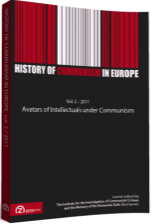The Finite Universe: Discursive Double Bind and Parrhesia in State Socialism
The Finite Universe: Discursive Double Bind and Parrhesia in State Socialism
Author(s): Marta Erdős, Gábor KelemenSubject(s): History
Published by: Zeta Books
Keywords: Soft dictatorship; discursive double bind; parrhesia; critical reflectivity
Summary/Abstract: Readers are invited into a universe established by the discursive practices of “soft dictatorship” in Hungary between 1957 and 1989. The two major categories of our epistemic discourse analysis, representing the internal struggles of the intellectuals in the era, are manipulation and parrhesia. Manipulation is understood as an abuse of power; it impairs human collaboration and social development by delimiting social participation. Parrhesia is an act in which the speaker expresses his personal relationship to truth, taking the risks and responsibilities of veridiction in crisis situations. A most effective form of manipulation is maintaining double bind relations by certain discursive techniques. Double bind is a habitual practice of molding one’s long-term expectations on social contexts: one’s physical and/or psychological survival is at stake, but escape is made impossible. When helpless attitudes have been formed, due to confusion over inconsistent messages, no external threat is necessary any more. Double bind relations may result in self-destructive forms of behavior, the construction of false selves, passivity and a visionless approach to life. Occasionally, it may foster trans-contextual creativity, representing a precious but transitory resource for intellectuals to practice critical reflectivity. The authors analyze here contemporary texts (political speeches, philosophical papers, literary works, jokes and a film). Portraits of intellectuals reveal that the immense power of truth and the inability to confess it is a torture in any communist system. There are many victims of a dictatorship: those who were killed or prosecuted; the victims who could survive but society has not responded to their traumatic experiences; those who tried to find compromises and found a purposeless life instead; those who believed in a single truth and were deceived; and those who were actively searching for truth and came to the conclusion that there might be many faces of truth – but none of these can be seen clearly in a false social context.
Journal: History of Communism in Europe
- Issue Year: 2011
- Issue No: 2
- Page Range: 281-308
- Page Count: 28
- Language: English
- Content File-PDF

